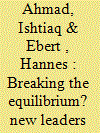|
|
|
Sort Order |
|
|
|
Items / Page
|
|
|
|
|
|
|
| Srl | Item |
| 1 |
ID:
138497


|
|
|
|
|
| Summary/Abstract |
The election of new governments in Pakistan and India in 2013 and 2014, respectively, has sparked controversies about the likely trajectory of the enduring rivalry. Emerging individual and domestic conditions reportedly created new opportunities for incremental rapprochement. Equipped with strong political mandates and backed by powerful constituencies, Pakistan's Nawaz Sharif and India's Narendra Modi initially set out to stabilize and revive their countries’ fragile economies and declared improved bilateral ties as a key precondition for implementing their economic agendas. However, mutual recriminations and border tensions resurfaced soon to prevent the revival of the stalled diplomatic dialogue in late 2014. Drawing on a thorough review of research on rivalry maintenance and termination and, in particular, the assumptions of the punctuated equilibrium model developed by Paul Diehl and Gary Goertz, this paper demonstrates how the conflict's structural complexities are likely to persist and undermine the chances for conflict resolution in the years ahead. The prevalent role of the army and a vibrant anti-Indian Islamic ideology in Pakistan, the persistence of a conflict lobby in India, lingering territorial feuds and ever increasing power asymmetries between the two countries, and decreasing third-party mediation in the Indo-Pakistani conflict will likely suffocate any initiative, however well-intended or pragmatic it may be. Even if bold leadership manages to revive a comprehensive peace process, it would have to be based on systematic confidence building measures in order to make it resilient to crises.
|
|
|
|
|
|
|
|
|
|
|
|
|
|
|
|
| 2 |
ID:
159749


|
|
|
|
|
| Summary/Abstract |
The literature on environmental peacemaking argues that cooperation in the face of shared environmental challenges can facilitate further cooperation, trust building, and eventually peace between states in conflict. Empirical research on environmental peacemaking, predominantly conducted in the form of single case studies, has so far been inconclusive. This article uses a cross-case, multimethod research design to test the environmental peacemaking proposition. More specifically, it argues that the conclusion of a cooperative environmental agreement can have a positive impact on reconciliation between rival states. Based on a new dataset on international rivalry termination, transboundary protected areas, and international freshwater agreements, this article first conducts a statistical analysis and a qualitative comparative analysis (QCA). The results are then verified and refined by six case studies. Triangulation of findings from the three studies suggests that the conclusion of a cooperative environmental agreement facilitates reconciliation in international rivalries. But this effect is contingent on a number of scope conditions, such as high environmental attention, internal political stability, wider patterns or traditions of environmental cooperation, and already ongoing processes of reconciliation. Still, the findings imply that environmental challenges do not only affect peace and security in a negative way. Addressing them jointly also opens opportunities for peacemaking and peacebuilding between states.
|
|
|
|
|
|
|
|
|
|
|
|
|
|
|
|
|
|
|
|
|